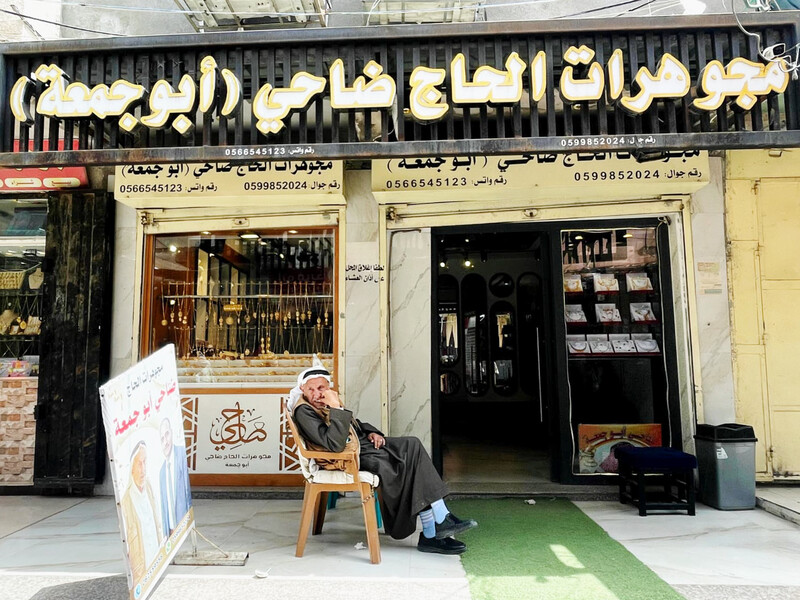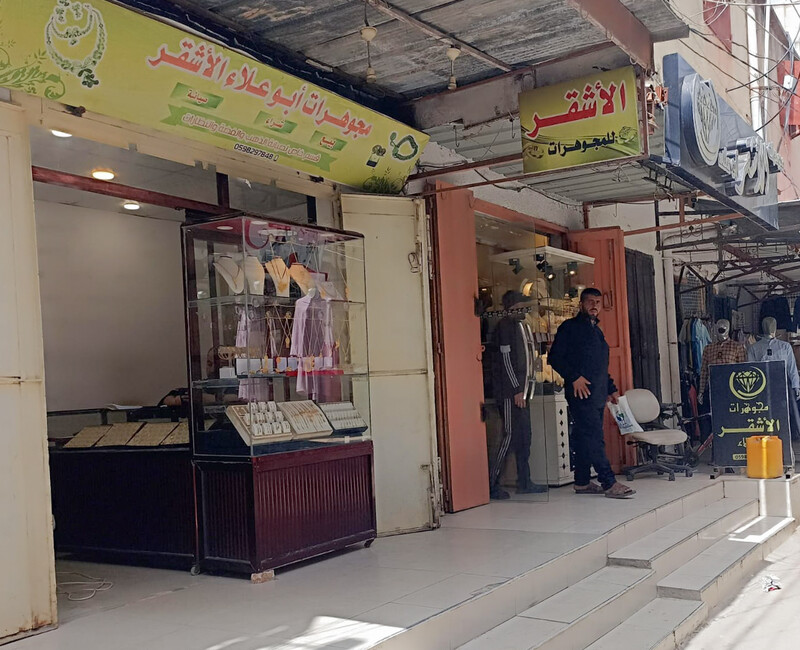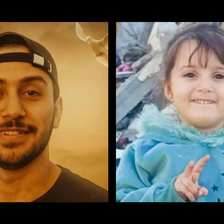The Electronic Intifada 20 May 2025

Dahi Abu Juma in front of his shop in Nuseirat refugee camp.
In 2006, Dahi Abu Juma, 76, began selling in the gold market of Nuseirat refugee camp.
“I owned a small shop at first and was working alone,” Abu Juma said.
He eventually trained his five sons as goldsmiths and taught them the trade of buying and selling gold.
In 2017, Abu Juma’s sons joined him in the business, expanding the small shop into two adjacent stores.
The original shop remained as a sales point for gold while the second one served as a workshop to craft bracelets and wedding rings.
With the siege on Gaza halting the entry of new shipments, Abu Juma started recycling gold by melting down bangles or broken earrings to keep his business afloat.
Abu Juma said that on 23 January 2024, his workshop was hit by a drone-fired missile.
The main store remained intact but the workshop was partially destroyed. Abu Juma recovered only a few undamaged tools from the debris.
“Alhamdulilah, neither my sons nor any customers were in the shop at the time of the strike,” Abu Juma said.
Abu Juma and his sons repaired the workshop by removing the rubble and rebuilding the damaged walls.
But the gold market is no longer profitable as most of the people come to sell their gold for cash to buy food, flour, medicine or even baby formula. Currently, there is little to no demand to buy gold.
Women’s stories
Abu Juma now spends his days in the main store where he signs the receipts when a customer sells or buys gold.
“I listen to the women’s stories – stories that tear my heart apart,” Abu Juma said.
During the war, a woman came to Abu Juma’s store and wanted to return the gold her fiancé had bought her from the shop for their engagement.
“Her fiance was killed,” he said. “It broke my heart – I didn’t know what to say or do. I just tried to help her calm down.”
Another woman came to the store to sell a ring her husband had given her to buy food for her children as the father became jobless.
Even one of Abu Juma’s relatives came to him to sell a bracelet made of gold liras.
“I refused to let her sell her bracelet – it was a memento of her husband,” Abu Juma said.
But when Abu Juma offered to help if she needed money, she explained to him that her husband was killed during the Nabulsi massacre while trying to get flour.
“I didn’t know that her husband was killed while trying to secure flour,” he said. “And now she was selling the golden bracelet he gave her to buy flour and feed her children.”
Empty shelves
Abu Alaa al-Ashqar, 38, has run a shop selling jewelry on the main street in Nuseirat since 2017.
He used to source his gold from other Gaza-based goldsmiths or import it through Egypt.
“Gold imports have stopped since the war began,” he said. “The shelves are nearly empty.”

Abu Alaa al-Ashqar in front of his shop in Nuseirat.
Women come to al-Ashqar’s store not to browse but to sell their husbands’ gifts – a single earring or a thin ring.
Al-Ashqar said, “I don’t trade anymore – I only help people survive.”
The shop owner is in the same situation of extreme deprivation as his customers. He and his wife and their three children now depend on food parcels from UNRWA, the UN agency for Palestine refugees, and haven’t eaten meat in months.
Nothing left
Muhammad al-Bayoumi, 56, is a well-known goldsmith who has been working in al-Bureij in central Gaza since 2011.
His income depended entirely on selling and repairing gold in his shop beneath his home.
“I have been working in the gold field for more than 13 years. Though the profit was never large, I was content,” he said.
In late December 2023, al-Bayoumi had to flee with his family as the Israeli army ordered all residents of al-Bureij to evacuate.
“I couldn’t take anything from the house or the gold shop. I sheltered with my family in the nearest school in Nuseirat.”
A week after al-Bayoumi fled, his niece called and informed him that his house and gold shop had been reduced to rubble.
When the Israeli army withdrew from al-Bureij in February 2024, al-Bayoumi returned to what was once his home and store.
“There wasn’t even a trace of the gold shop,” he said. “There was nothing left to salvage.”
He and his seven family members lost their only source of income and live in a tent in Nuseirat.
Al-Bayoumi estimated the value of the lost gold to be more than $480,000.
“I tried selling secondhand clothes, but it barely brought in enough for bread and lentils,” he said.
“I was stripped of everything I once had.”
Razan Abu Salem is a writer and translator based in Gaza.





